Creating Connections
An in-depth exploration into what teaching styles resonate with students
As human beings, we strive to build connections, to meet people we genuinely care about and establish long-lasting relationships. We love to be cared for, shown that we matter. Teachers do this every day, acting as a mentor of sorts and finding new ways for our voices to be heard.
Every student is unique, and responds to things differently. For example, one student might be much more visual, being easily satisfied with power points and videos while another will prefer hands-on learning, with various labs and more 3D models. Students have so much diversity when it comes to how they learn, just as teachers vary in how they teach.
Teachers like Ms. Gehrke, for instance, focus more on giving their students a method of self-expression, showing students that they can openly be themselves in the classroom.
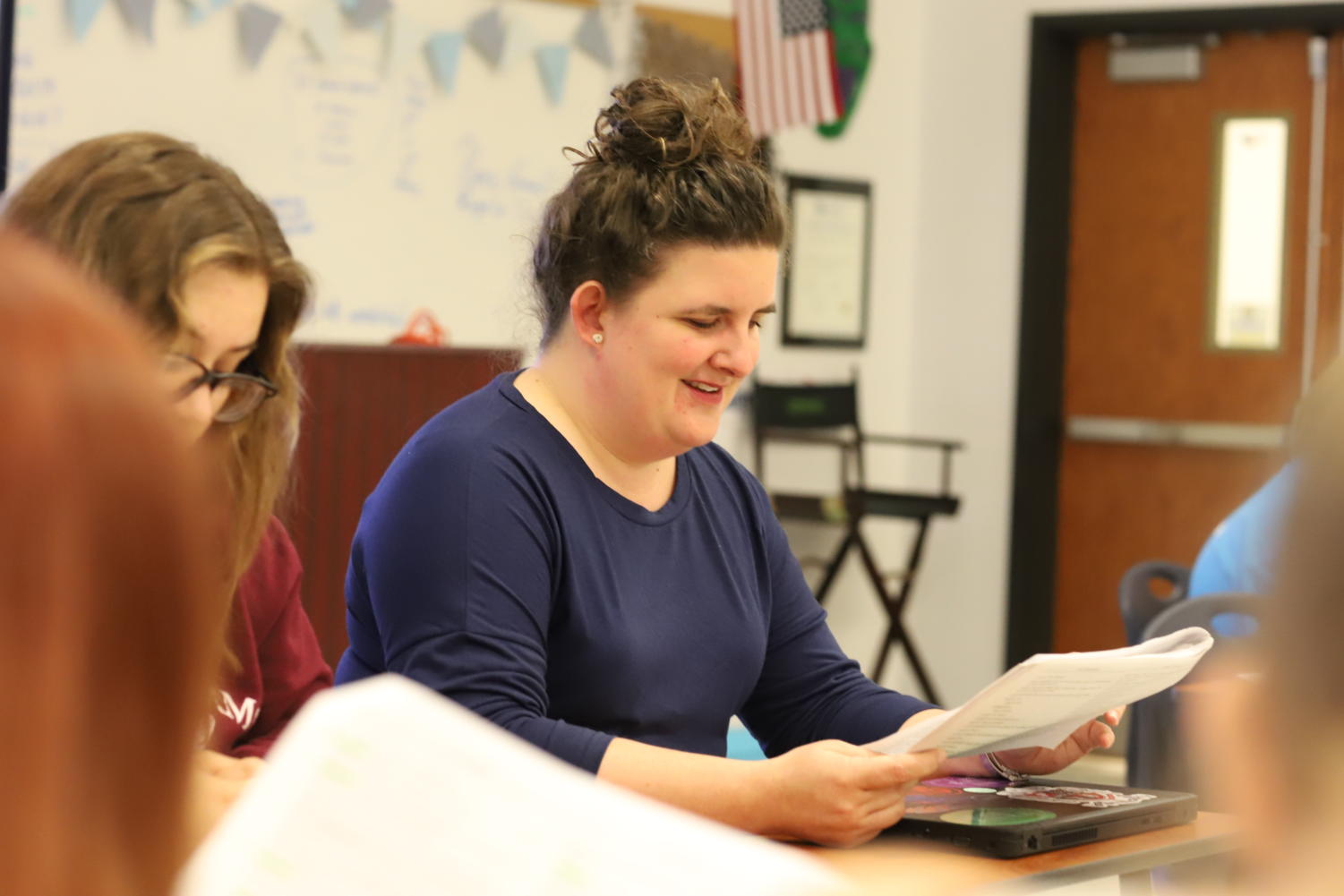
“As a theatre teacher, my teaching style is a lot more about allowing students to be themselves, creating a safe space and atmosphere where people can relax a little bit because it’s kind of required whenever you’re getting up in front of people and you have to be vulnerable,” she said. “That goes for public speaking too. You have to feel comfortable getting in front of people. So probably a little bit more relaxed, a bit more trying to really hear people’s thoughts and ideas and allow a lot of buy-in and investment into the classroom.”
Gehrke, who has been teaching for 11 years, is in charge of the theatre program. She handles a variety of courses, ranging from technical theater, theater arts, acting, improv, and public speaking. Her reasons for teaching are a blend of love for her students, and a passion for what she does.
“I sat down and made a list of the things I liked and the things I didn’t, because I had been working in business for a while and I didn’t love it, and then all things led to teaching,” Gehrke said. “I was thinking about it from the perspective of when I was in high school because I went to a really small school and so my English teacher also taught theatre, so I wanted to get dual certified cause I assumed I would have to do both in order to become a theatre teacher, and then I realized that Missouri schools are much bigger so now I get to just do theatre.”
Like most teachers, Gehrke finds her motivation for teaching within her students.
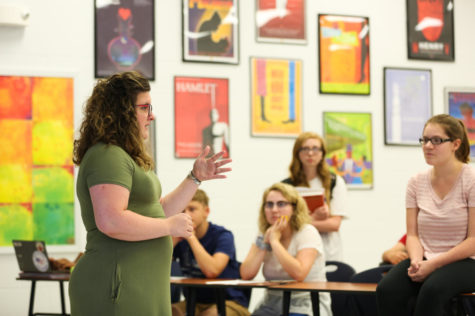
Gehrke speaks during a drama club meeting last school year.
“[My teaching is about] relationships with students. Making connections with students and I think the beauty of theater is that it’s all about trying to create art where it’s all about being empathetic and getting into other people’s shoes, and so you can’t really create that unless you are trying to create that in real life too, when you can see where other people are coming from,” Gehrke said. “I want them to see that you can follow your passion, that it is much easier to be kind than to spend time creating more drama. A lot of students know a lot about me, and I think that being able to show people that you can have a positive attitude and approach to life and approach to people that are different than you.”
In this Gehrke is successful, a fact that will be backed up by many of her students, including senior Dylan Lindke.
“I have enjoyed how wild and crazy every one of [her classes are], and how much I can be myself. She supported me through the plays, and just any family problems that have happened,” Lindke said. “Like if I do walk in there and I look really sad or stressed, she’ll ask me how I’m doing. She doesn’t really have to ask but she’ll still ask and sit there and talk with me during class.”
According to Lindke, Gehrke teaches very similarly to Mr. Eversole and Mr. Tutterow, in the way that they “just kind of let things happen, like going with the flow, not stressing so much about the little details.”
Mr. Walterbach, known for his more laid back and fun style of teaching, also teaches for the sake of his students.
“I hope that when students are at Liberty they are having the best time and learning. A lot of students are at Liberty more than they are at home. I want them to always be comfortable and safe,” Walterbach said.
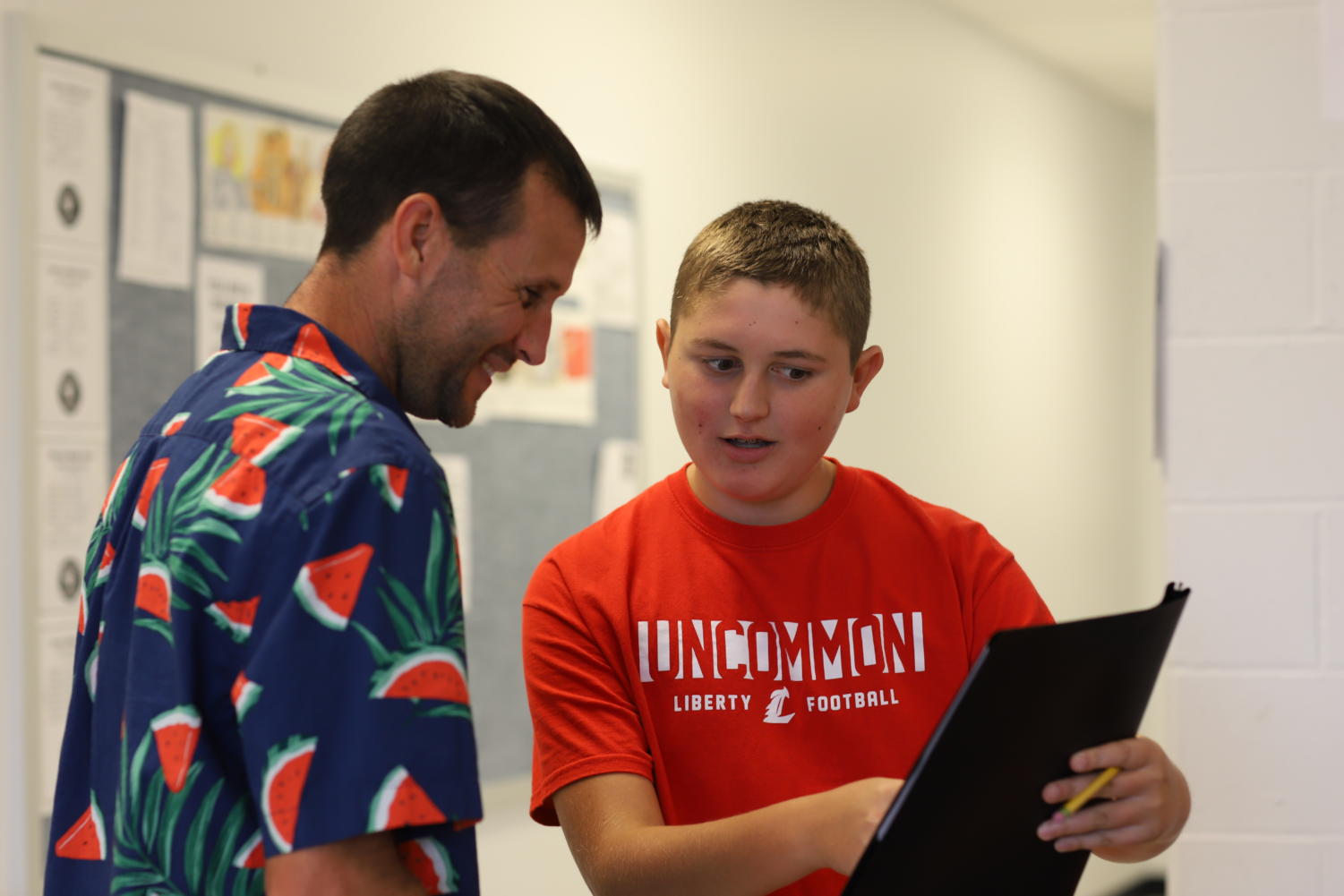
Walterbach, who has been teaching for 14 years, teaches Advanced History, Western Civilization, and AP European History. He also coaches the varsity girls’ basketball team, another factor in his decision to pursue teaching.
“[Teaching is] just something that I always wanted to do. I knew I didn’t want an office job and I really wanted to be involved in sports after college ended. I had great teachers in high school and saw/experienced the impact they had. I knew it was the job for me,” Walterbach said. “When I was coaching basketball one of my first years, my head coach said to me ‘remember they are someone’s kids.’ I don’t know why, but that stuck with me. I want to teach that way also. I hope to give all students respect and a chance. Now that I have three kids of my own, I really teach and coach by that phrase.”
Students are able to resonate with Walterbach’s more lively lessons, including freshman Ben Young.
“I like how he lets us do notes the way we want, and we’re not graded on them or anything. He’s pretty fun,” Young said.
According to Young, Walterbach teaches similarly to Mrs. Jacks, one of the math teachers here at Liberty.
Like most teachers, Walterbach still sees students struggling in class, but for that, he has an easy fix.
“Just talk to them. Communication solves a lot of issues and misunderstandings,” Walterbach said.
Mr. Schaper, who is loved by many of his past and present students, focuses on trying to better his students by teaching them by giving them a voice.
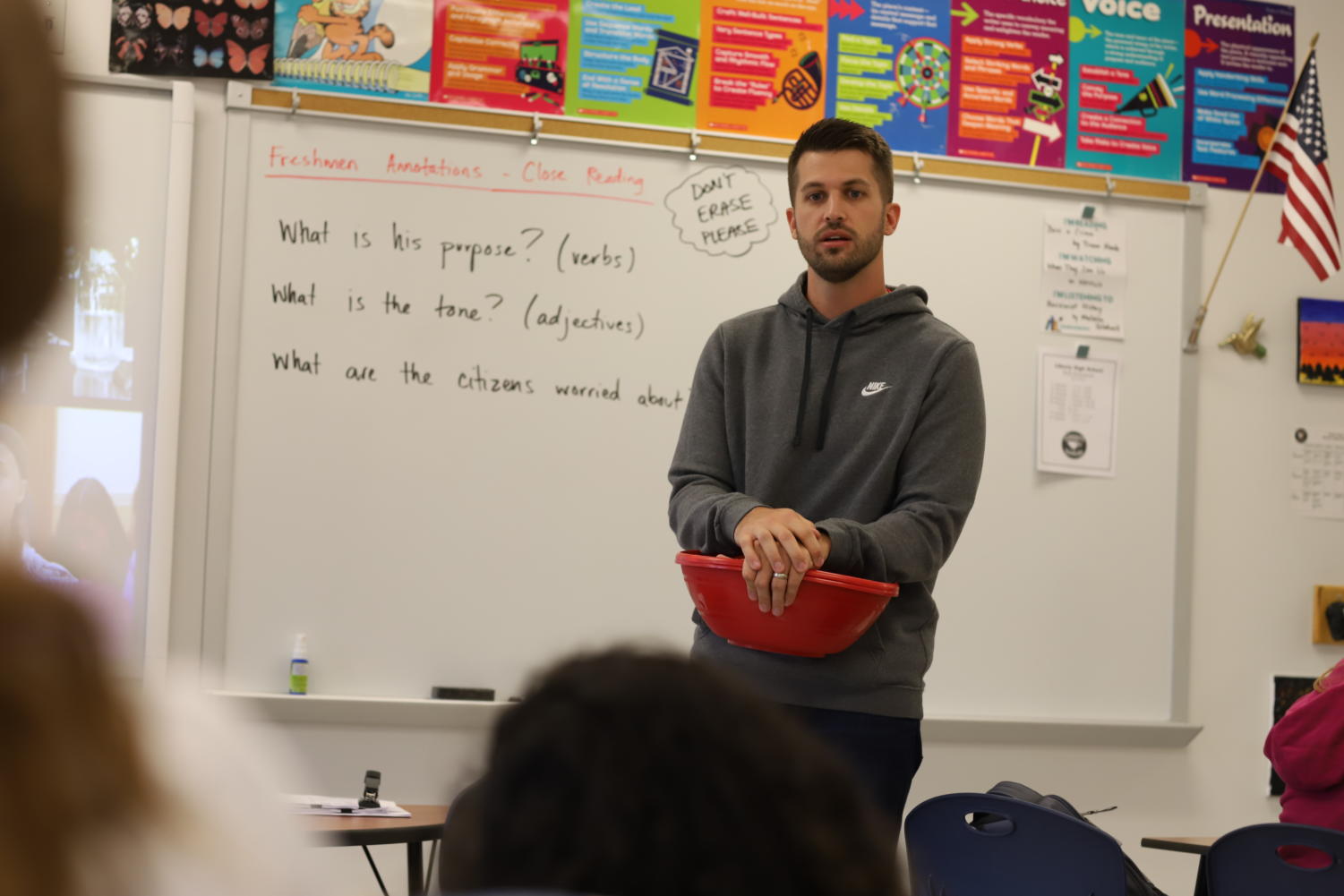
“Naturally in English class you’re writing about things that are sometimes personal and sometimes just strike a chord with you, and you have kids that have a lot on their mind, and the whole idea for me in class a lot of the time is telling kids that they have something to say, and sometimes that something won’t really reveal itself to you until we talk about some idea in class. Then all of a sudden you’re like, ‘I got opinions,’ and sometimes those opinions or what a kid really needs to get out is hard, so you just need to be really willing to listen to kids,” Schaper said. “Validate kids in the same way, one of the best things a teacher ever did for me was make me feel heard, it’s really easy to get lost in a class of 33 kids at a time. Sometimes you have kids that are all but waving their arms saying, ‘Notice me!’ so notice them, just listen to what they have to say. More often than not you don’t even have to say anything back, you just be there and listen to them say whatever it is that they need to say, and just make them feel heard.”
Schaper, who teaches Advanced English 1, English 1 and English 3 has been teaching for five years. He realized that teaching was for him when he looked back at his own high school experience, and saw how his teachers had shaped him.
“I had good teachers, and I was also a very unfocused student, and when it came time to start thinking about my future teaching was really one thing that I had thought about, and I was like, ‘Okay, this environment that I’m in every day, like, I could do this,” cause I liked school. I liked school but I wasn’t always the best at it, I didn’t always try my hardest but I liked being there,” Schaper said.
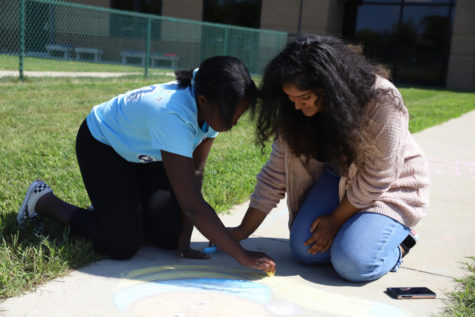
Mr. Walterbach’s AP Euro class creates chalk art during class.
Schaper has big dreams for each of his students, which he tries to help them achieve through the use of thought-provoking questions and relating old material to current events in class discussions.
“I hope that every kid that leaves class at the end of the year can just really do a couple of things well, or at least better. One would be to have more perspective, that’s probably the chief element of reading all of this stuff, and doing what we do, I think you get perspective. I really want kids to feel like literacy is the gateway to a lot of opportunities, you know, even if you’re just being more literate in your communication and your ability to write and to read and to think,” Schaper said. “Reading and writing are how you form thoughts, even like writing out your ideas, you’re creating a road map for your brain, like this is what your brain is trying to tell you. The process of taking this jumbled mess in your brain and putting it out there, whether you’re speaking or writing an essay or taking in somebody else’s words, that is all just sharpening your focus on how to think, and how to be a well informed human being.”
Schaper not only pushes his students to be better, but is understanding when life gets in the way.
“Listen. Try not to talk too much. Just giving kids time is a big one. There’s like two things usually for accommodations with most students. I think it’s easy to forget how busy students are, you have a lot of classes to worry about and you have a social life that’s really unique, and demanding in a way that even people my age didn’t experience,” Schaper said. “I graduated high school 10 years ago, and 10 years is 10 years but it wasn’t forever ago. I feel like students are so much more preoccupied socially than I was. So you have to make some accommodations there, I think, for assignments and things, and you have kids that you can visually see are way busier than you probably would expect. At the end of the day, I care about due dates, just because it helps me stay sane and up to date in the grade book, but I care more about the learning than I do the day or the minute it was turned in. Timeliness is great but learning is better, if you have to pick one, I think the choice is obvious for me.”
Sophomore Avery Schlattman is one of the many students who knows and loves Schaper.
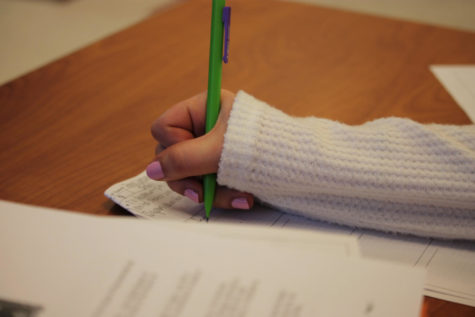
Students learn in Mr. Schaper’s class, while still connecting and discussing with their peers & teacher.
“He’s definitely one of the best teachers I’ve ever had, I go and visit him constantly and I know a lot of people feel the same way. I’ve never met somebody who didn’t like Schaper. If you ever get to have a class with him, then you’re lucky,” Schlattman said. She states that Schaper teaches very similarly to Ms. Genenbacher.
Schaper, like many of the teachers that students resonate with, teaches for their sake.
“[I teach for the] kids. Just kids, period. This is all I’ve ever done, I don’t have much life experience outside of teaching, but I don’t think there are a lot of jobs where what you do every day is so deeply tied to somebody’s well being,” Schaper said.
Another teacher known for his fun-loving personality and connections with students is Mr. Barker. His goal is to help students find happiness, whatever that may mean for them.

“I would say my goal for my students is to find happiness, and happiness is a really difficult complex thing and people think it’s simple,” Barker said. “It involves working hard, it involves accepting who you are and loving who you are, it involves loving those around you without judgment, it involves, like, so many more things, so if I can leave an impact to give students the confidence that they’re allowed to be who they are and do whatever they want to do, that they only have their own lives to answer for, in that sense. I hope that that’s my impact, that I leave them understanding that they have something great inside of them and the journey to find it is worth it.”
Barker teaches AP Psychology, Sociology, and Contemporary Issues. He’s also a former English teacher, Chemistry teacher, and has taught a slew of social studies courses. Barker realized that teaching would fit him after trying a couple of different jobs, and evaluating his interests.
“I think originally, I know I’m not somebody that could sit still at a desk, and I tried some jobs like, I was a painter for a while, and I didn’t want to be outdoors all the time necessarily in the cold and the heat, so I wanted something where I wouldn’t get bored and I’m doing something different every day but I also wanted to be working with people so it was kind of the intersection of that. I also want to try to make the world a better place and not a worse place, so this is the only job I could think of that did all those,” Barker said.
Barker really focuses on helping his students through their struggles, and understanding that not every day will be a perfect one.
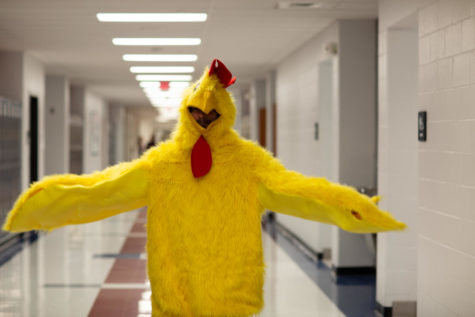
Mr. Barker’s outlook on life (even while in a chicken costume) is uniquely optimistic and inspires students everyday.
“My number one way I accommodate is with empathy, because I know that I too have had a bad day, and I remember the time someone had a bit of love or patience with me, and how much more that meant to me. You know, you go through a breakup, you’re sick, you go through a pet passing away or a family member you lose,” Barker said. “It is so hard to concentrate on the task at hand when you’re emotionally needing some support. So when kids have those various days that take their focus from education whether it is a tragedy or sometimes even the good stuff like Homecoming is tomorrow like, okay, we’re gonna try and learn as much as we can but we’re gonna sprinkle in an extra bit of fun to not kill the joy. Whatever those distractors are I think that if you can accommodate for the human side of students, the educational side always takes care of itself because students are seeing that you care and are motivated to do their best because they see value in their own life. That’s really why they come to school, because they want to build a life from themselves, and so that’s really where it starts.”
Junior Abby Shields loves Barker’s teaching style, and enjoys his class more than most.
“He makes things really simple to understand, and he has a lot of fun. He’s able to make me enjoy and learn something that I want to learn about, while also having fun in class. He does a really good job of giving physical or real-life examples and just having fun without taking everything so seriously or being too strict,” Shields said.
When asked what she would say to Barker as a thank you, Shields knew exactly what to say.`
“I would say thank you for not just sitting and talking, but actually interacting and getting to know your students. He actually tries to understand me as a person rather than just thinking of me as a letter grade, he’s very big on the fact that we are more than a letter, it’s who we are as people and how we learn,” Shields said. “If I ever had a problem he’s always been able to talk, and I’ve had other friends who have also gone to talk to him about personal issues. He’s a super supportive guy, doesn’t matter what it is, he’ll listen.”
According to Shields, Barker’s teaching style is much like those of Ms. T-O, Mr. Schaper, and Mr. Cole.
Due to their different goals and inspirations, teachers will teach differently, each accommodating a different sort of student. These various styles and unique connections help make each teacher so special. Teachers are sometimes the unsung heroes, not appreciated for the impact they have on our lives. They’re here, they’re teaching us because they want to help us, because they genuinely want to watch us learn and grow. They may not always show that, we may not always be able to see past a strict exterior to understand that, but in the long run they are the reason we’re educated, they are the reason we can pursue our dreams and achieve our ambitions.

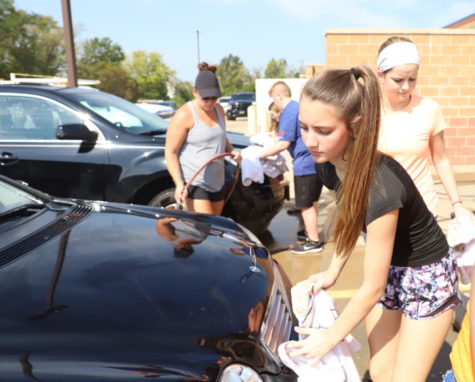
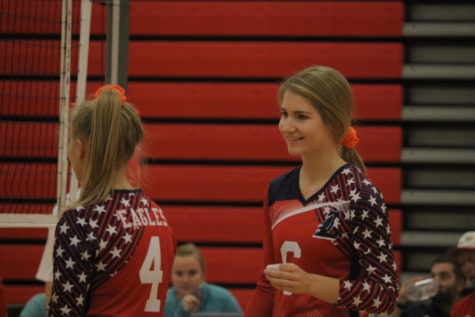


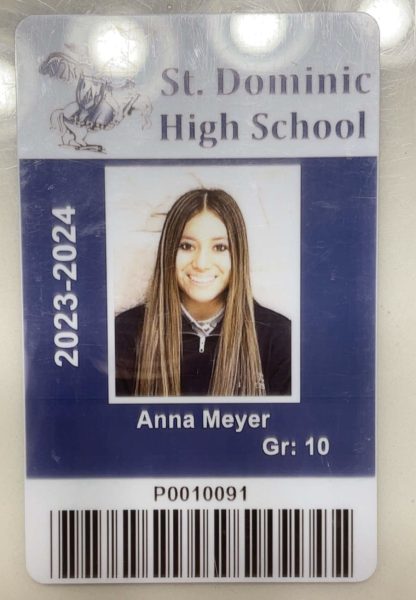


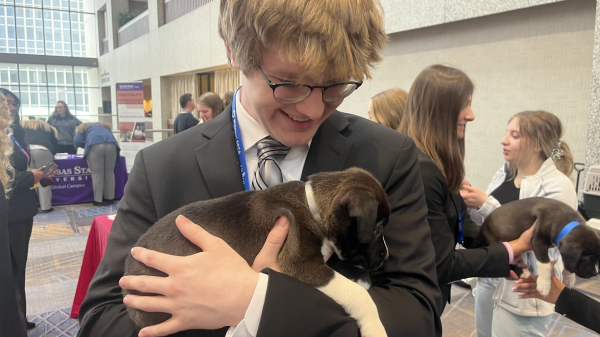




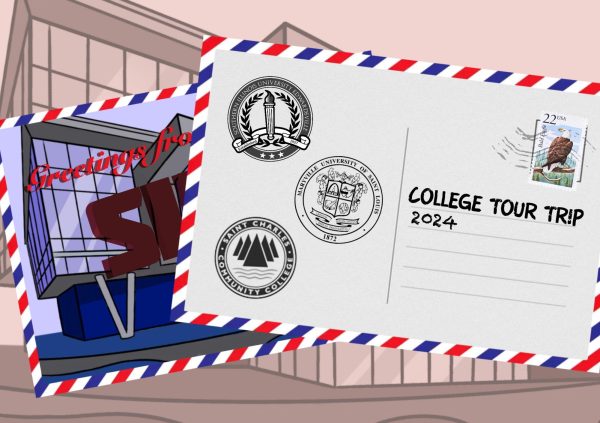

Lizzie Kayser | Oct 11, 2019 at 9:03 am
What an excellent look into the impact teachers have on us! Great job!